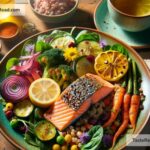The Connection Between Diet and Sleep Quality
Sleep is one of the most important aspects of our health. It helps us recharge our bodies and minds, boosts our immune system, and even improves our mood. But many of us struggle to get a good night’s sleep. While there are many factors that affect sleep quality—like stress, screen time, and environmental conditions—one surprising factor is what we eat. Yes, your diet plays a huge role in how well you sleep at night!
In this blog, we’ll explore how food impacts sleep, what you should eat to improve sleep quality, and what foods to avoid if you want to wake up feeling well-rested.
Why Diet and Sleep Are Connected
The human body is like a complex machine where everything is connected. Food provides the fuel that keeps us going, and sleep is the downtime needed to repair and recharge. These two processes are tied together more than you might think.
Certain nutrients and chemicals in food directly affect the brain and hormones responsible for regulating sleep. For example, serotonin and melatonin are key for sleep. Serotonin is a “feel-good” brain chemical that helps calm you down, while melatonin is sometimes called the “sleep hormone” because it signals your body that it’s time to rest. The foods you eat can either help increase these chemicals or disrupt their production.
Additionally, your diet affects your overall health. High blood sugar levels, digestive problems, and weight gain can reduce sleep quality. On the flip side, eating a balanced diet can help promote deeper, more restorative sleep and leave you feeling refreshed when you wake up.
Foods That Improve Sleep Quality
If you’re looking to improve your sleep, focus on eating foods that promote relaxation and support healthy sleep cycles. Here are some examples:
1. Foods Rich in Magnesium
Magnesium is a mineral that helps relax your muscles and calm your nervous system. This can lead to better sleep. Foods like spinach, nuts (like almonds and cashews), seeds, bananas, and avocados are excellent sources of magnesium.
2. Foods High in Tryptophan
Tryptophan is an amino acid that gets converted into serotonin, which helps you relax, and eventually into melatonin, which helps you sleep. Turkey, chicken, eggs, cheese, yogurt, and nuts contain high levels of tryptophan.
3. Complex Carbohydrates
Carbs affect the release of serotonin, making them beneficial for sleep (but stick with healthy carbs). Whole grains like oatmeal, brown rice, and quinoa can help you unwind.
4. Sleep-Friendly Drinks
Drinks like chamomile tea, warm milk, and herbal teas help calm your body and mind. Chamomile tea, in particular, contains apigenin, a compound that promotes relaxation. Warm milk’s tryptophan and calcium combination can make falling asleep easier.
5. Foods High in Melatonin
Melatonin is a hormone your body produces naturally, but you can also get it from foods like cherries, grapes, tomatoes, and oats. Eating these before bed could help regulate your sleep cycle.
Foods to Avoid Before Bed
Just like some foods improve sleep, other foods can harm it. Here are key foods and drinks to avoid before bedtime:
1. Caffeine
Caffeine is a stimulant that keeps your brain alert, which is the opposite of what you want when trying to sleep. Found in coffee, tea, chocolate, and energy drinks, caffeine can stay in your system for hours, so try to avoid it at least 6 hours before bed.
2. Sugary Snacks
Eating sugary desserts or snacks late at night can cause a spike in blood sugar levels, making it hard for your body to relax. Plus, the sugar crash later may wake you up from your sleep.
3. Heavy or Fatty Foods
Eating a heavy meal full of fried, greasy, or fatty foods close to bedtime can cause indigestion and discomfort, making it harder to fall asleep.
4. Spicy Foods
Although delicious, spicy foods can irritate your stomach and cause heartburn for some people. This is especially true if you eat them late at night.
5. Alcohol
While alcohol might initially make you sleepy, it disrupts your sleep cycle and prevents you from entering deep, restorative sleep. Drinking it before bed can lead to poor-quality sleep and waking up tired.
Timing Matters, Too!
It’s not just about what you eat—it’s also about when you eat. Try to finish heavy meals at least 2-3 hours before bedtime to give your body time to digest. Eating late at night or snacking right before bed can cause bloating, heartburn, or discomfort and make it harder to fall asleep.
Simple Tips for Better Sleep Through Diet
Here are a few simple habits that can make a big difference in your sleep quality:
- Eat Balanced Meals: Focus on a diet rich in fruits, vegetables, whole grains, lean protein, and healthy fats.
- Snack Smart: If you need a nighttime snack, choose a sleep-friendly option like a banana, a handful of nuts, or a small bowl of oatmeal.
- Stay Hydrated: Drink enough water during the day, but avoid drinking lots of fluids right before bed to prevent waking up to use the bathroom.
- Avoid Stimulants: Cut back on caffeine and sugar in the afternoon and evening.
Conclusion
Your diet is a powerful tool that influences many aspects of your health, including your sleep. By choosing foods that promote relaxation and avoiding those that interfere with sleep, you can create a lifestyle that helps you wake up feeling refreshed and energetic. Remember, healthy eating during the day leads to better rest at night—and better rest means a healthier you.
Start making simple changes to your diet today; your body (and your sleep) will thank you!


